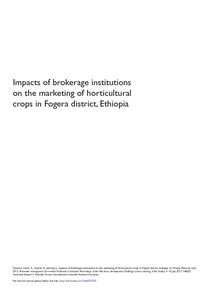Resource information
Fogera District, where the study focused, is endowed with diverse natural resources. It has huge potential water sources which are suitable for irrigation during the dry season for the production of horticultural crops mainly vegetables. However, there is a great market problem in the area associated with the nature of horticultural crops such as perishablity and seasonality in production. Moreover, the area is characterized by the existence of strong brokerage activity with their economic role not known. Thus, the main objective of this study was to analyse the economic roles played by the brokerage institutions in smallholder market linkages to market outlets in horticultural marketing and determinants of decisions on whether to use brokerage institutions or not under imperfect market condition in Fogera District, in northwestern Amhara Region particularly focusing on onion and tomato. Both secondary and primary data were collected for the study. Primary data were collected from a very wide number of respondents at all stages of the market channel where brokers are expected to play role. Two stage sampling techniques were used to select the sampled farmers. Descriptive and econometric statistical models were employed for data analysis using STATA software. The study implemented the Propensity Score Matching (PSM) model. The result of the study showed that the brokerage institutions are characterized as urban, peri-urban and farmer brokers. There was significant brokerage activity only for onion marketing and in the case of tomato marketing the brokers act as rural assemblers. Most of the horticultural trading in the area is undertaken by credit and thrust based and in this arena brokerage institutions are playing most important role by linking smallholder farmers to market outlets. Logistic regression estimation of Propensity Score Matching model revealed that age, education level, distance of residence from development agent office, distance of residence from Woreta market, distance of residence from main asphalt road, access to cell phone (mobile phone) and number of regular wholesaler customers significantly affected the participation decisions of the smallholders in the brokerage institutions services. Kernel Matching with band width of 0.25 was found to be the best matching algorithm. The result of the study also revealed that smallholder farmers using brokerage institutions have got 4393.62 ETB higher net income and 13.55% of greater marketed surplus than those smallholders who do not use. Generally, the brokerage institutions are playing significant and important role in forming market linkages between smallholders and wholesalers under imperfect market conditions with their limitations. Therefore, the study highly recommends the formalization of the brokerage institutions through licensing, training and continuous follow up in the district considering the experience of ECX.



